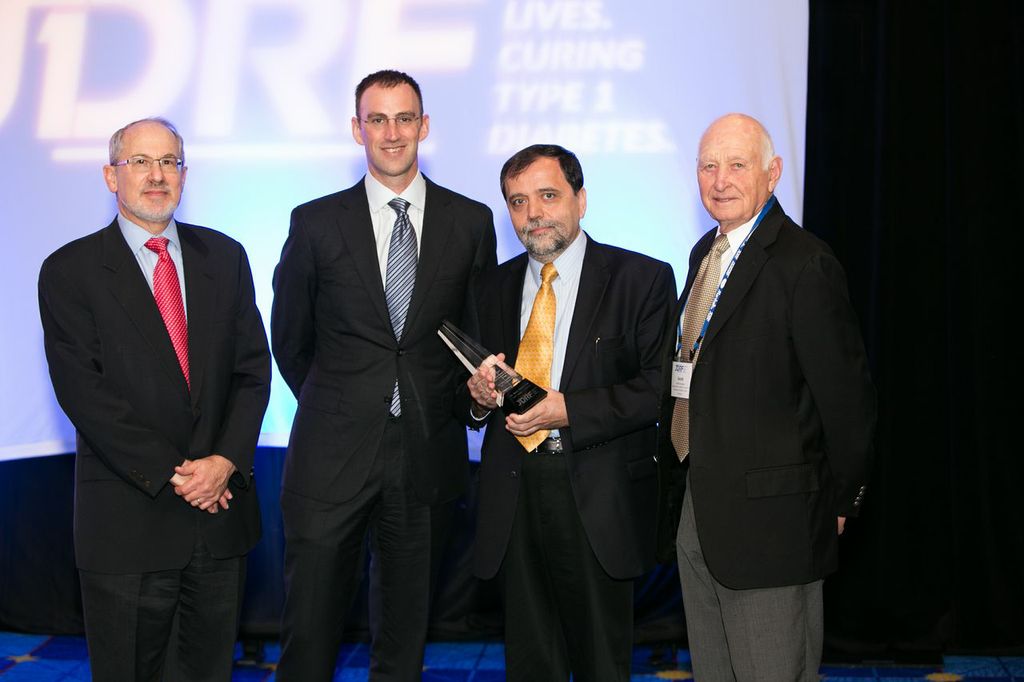JDRF Honors University of Virginia Researcher for His Outstanding Contributions Toward Artificial Pancreas Systems
Contact:
Tara Wilcox-Ghanoonparvar, 212-479-7524; twilcox-ghanoonparvar@jdrf.org
―Boris P. Kovatchev, Ph.D., professor and founding director of the UVA Center for Diabetes Technology, received the Gerold & Kayla Grodsky Basic Research Scientist Award today at JDRF’s OneConference in Washington, D.C.―

New York, NY, July 30, 2013 ― Boris P. Kovatchev, Ph.D., a pioneering researcher at the University of Virginia (UVA) and a leading player in the efforts to advance artificial pancreas technology, was honored by JDRF yesterday with the prestigious Gerold & Kayla Grodsky Basic Research Scientist Award. The annual award recognizes leadership and innovation in type 1 diabetes (T1D) research and was this year presented by its namesake, esteemed researcher Gerold Grodsky, Ph.D., at JDRF’s OneConference in Washington, D.C.
For more than 20 years, Dr. Kovatchev has lent his talents to the field of mathematical modeling and computing, focusing mostly on diabetes translational research. In addition to serving as a professor in UVA’s Department of Psychiatry and Neurobehavioral Sciences and an adjunct professor of systems and information engineering, he is the founding director of the UVA Center for Diabetes Technology.
“We are thrilled to be honoring Dr. Kovatchev, whose leadership in the JDRF Artificial Pancreas Consortium has been paramount in advancing the field,” says Richard A. Insel, M.D., JDRF’s chief scientific officer.
Among his contributions to diabetes research, Dr. Kovatchev is currently the principal investigator at UVA of the JDRF Artificial Pancreas Project, an international, multicenter project designed to test and advance artificial pancreas systems, which could help ease much of the burden of managing T1D. He designed and developed the use of in silico modeling and simulation, which has significantly reduced the time and cost of algorithm testing in animal models prior to use in humans—a tool endorsed by the U.S. Food and Drug Administration and now used around the world. He also led a team in creating a portable cell phone–based system that has allowed mobile testing of artificial pancreas systems, and he has led one of the first sites testing artificial pancreas systems in real-world conditions. In addition, Dr. Kovatchev has authored 136 peer-reviewed publications, lectures around the world on diabetes technology, and holds 36 U.S. and international patents.
“Recognizing the wealth of talent and breadth of influence that Dr. Kovatchev has offered to type 1 diabetes research is what this award is all about,” says Dr. Insel. “On behalf of JDRF, we congratulate Dr. Kovatchev and are grateful for all he does to advance important research to improve the lives of people with type 1 diabetes.”
###
About the Artificial Pancreas
In 2006, JDRF launched the Artificial Pancreas Project (APP) to accelerate the development of a commercially viable artificial pancreas system to ultimately mimic the biological function of the pancreas for patients with type 1 diabetes (T1D).
Currently, people with T1D must manually measure levels of glucose in their blood either by the traditional method of pricking the finger or by continuous glucose monitor, a device that senses glucose levels via a needle inserted under the skin. Then, based on these measurements, they must adjust glucose levels by taking multiple injections of insulin daily or by continually infusing insulin with a pump via needles placed under the skin. In addition, multiple other factors beyond insulin affect glucose values, making control difficult in people living a normal life outside a controlled hospital setting. This requires diligence and a tremendous amount of manual effort by the patient.
By automating detection of blood-sugar levels and delivery of insulin in response to those levels, an artificial pancreas system has the potential to transform the lives of people with T1D.
About JDRF
JDRF is the leading global organization funding type 1 diabetes (T1D) research. JDRF’s goal is to progressively remove the impact of T1D from people’s lives until we achieve a world without T1D. JDRF collaborates with a wide spectrum of partners and is the only organization with the scientific resources, regulatory influence, and a working plan to better treat, prevent, and eventually cure T1D.
As the largest charitable supporter of T1D research, JDRF is currently sponsoring $530 million in scientific research in 17 countries. In 2012 alone, JDRF provided more than $110 million to T1D research. More than 80 percent of JDRF’s expenditures directly support research and research-related education. In 2012 Forbes magazine named JDRF one of its five All-Star charities, citing the organization’s efficiency and effectiveness.